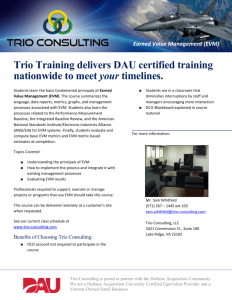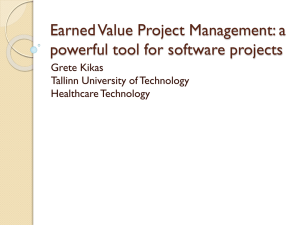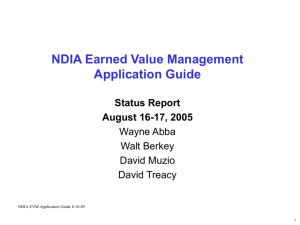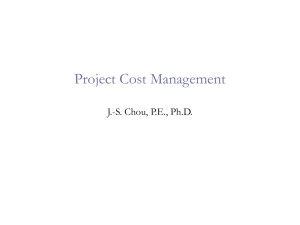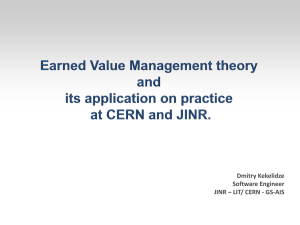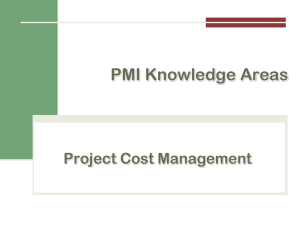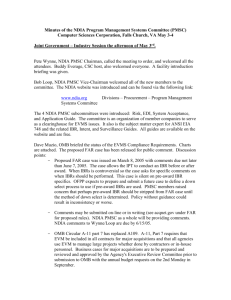View presentation
advertisement
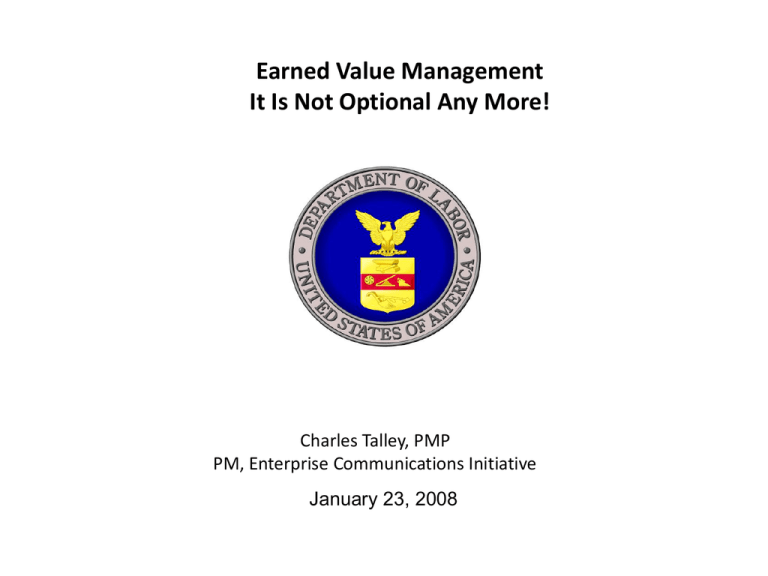
Earned Value Management It Is Not Optional Any More! Charles Talley, PMP PM, Enterprise Communications Initiative January 23, 2008 Agenda U. S. Department of Labor I. II. III. IV. V. VI. VII. VIII. Introduction History of EVM in the Government Recent Developments Effects of EVM on the Project Acquisition and Management Process Winning Projects Under the New EVM Rules Managing Successful Projects using EVM How the Government will use your EVM Reports Questions 2 Why This Presentation U. S. Department of Labor Government Computer News, 07/05/06 Acquisition councils finalize EVM rule By Rob Thormeyer Federal acquisition officials finalized a rule, effective today, that details how agencies should implement an earned-value management system for managing major acquisitions. the Civilian Agency Acquisition and the Defense Acquisition Regulations councils said the rule was not altered significantly from its April 2005 draft... “Small businesses may avoid all EVMS costs by choosing not to participate in EVMS solicitations, or may offset such costs to implement a compliant EVM system through cost reimbursement on resulting government contracts,” the rule said. 3 Why EVM? U. S. Department of Labor 70% of projects are: over budget or behind schedule 52% of all projects finish at 189% of their initial budget Source: The Standish Group 4 Developments That Moved the Government Toward EVM U. S. Department of Labor • 1950’s: The Department of Defense recognizes that its increasingly complex weapon systems development contracts demand more sophisticated management techniques than were generally used in industry. • 1960’s: DoD mandates a uniform DoD procedure for compliance by industry called Cost/Schedule Control Systems Criteria (C/SCSC) which evolves into EVM. • 1970’s and 1980’s: DoD continues to push an EVM standard as the way to track and report progress on weapons systems contracts. 5 Recent Developments U. S. Department of Labor • 1990’s: Several pieces of legislation and guidance make EVM the standard for all agencies to measure and manage project performance, including: – – – – Government Performance Results Act (1993) Federal Acquisition Streamlining Act (1994) Clinger-Cohen Act (1996) ANSI/EIA Std 748 (1998) • 2000’s: OMB continues to establish requirements for adequate performance measurement and reporting, including: – OMB Circular A-11, Part 7, Section 300 – OMB Memorandum M-04-24 (Expanded E-Gov) – OMB Memorandum M-05-23 (Improving IT Project Planning and Execution) – FAR EVM Clause Implemented 6 U. S. Department of Labor The Clinger-Cohen Act: Federal IT Projects Are Managed to Specific Standards First and foremost, laws governing federal IT Capital Planning requiring: • IT baseline assessment analysis • Monitoring and evaluation methods and techniques • Techniques for defining and selecting effective performance measures • Examples of and criteria for performance evaluation • Project time/cost/performance management • Creation of the OCIO Learn More: https://acc.dau.mil/CommunityBrowser.aspx?id=22170 http://www.dod.mil/cio-nii/cio/cca-comp.shtml http://www.dod.mil/cio-nii/cio/dodit/competencies.htm PS: Your firewall may require you to select “Continue to this website (not recommended)”. It is OK;, these are all government websites. 7 President’s Management Agenda (PMA) U. S. Department of Labor The President's Management Agenda, announced in the summer of 2001, is an aggressive strategy for improving the management of the Federal government. It focuses on five areas of management weakness across the government where improvements and the most progress can be made. Source: www.whitehouse.gov/omb 8 OMB Circular A-11/Exhibit 300 U. S. Department of Labor “Agencies must use a performance-based acquisition management system, based on the ANSI/EIA Standard 748, to obtain timely information regarding the progress of capital investments. The system must also measure progress towards milestones in an independently verifiable basis, in terms of cost, capability of the investment to meet specified requirements, timeliness, and quality.” Source: www.whitehouse.gov/omb 9 OMB Memo M-04-24 U. S. Department of Labor “…to achieve a “green” level of performance for this initiative, your agency’s actual performance cannot vary from its cost, schedule and performance goals by more than 10 percent. To achieve a “yellow” level of performance, your agency’s cost, schedule and performance overruns and shortfalls for all major information technology (IT) projects must average less Source: www.whitehouse.gov/omb and than 30 percent.” OPM PMA Scorecard 10 Executive Branch Management Scorecard U. S. Department of Labor Executive Branch Management Scorecard Current Status as of September 30, 2003 Human Competitive Financial Capital Sourcing Perf. E-Gov Progress in Implementing the President's Management Agenda Budget/Perf. Human Competitive Financial Integration Capital Sourcing Perf. E-Gov Budget/Perf. Integration AGRICULTURE COMMERCE DEFENSE EDUCATION ENERGY EPA HHS HOMELAND HUD INTERIOR JUSTICE LABOR STATE DOT TREASURY VA AID CORPS GSA NASA NSF OMB OPM SBA SMITHSONIAN SSA 11 OMB Memo M-05-23 U. S. Department of Labor Full implementation of EVMS for IT projects includes five key components: 1. Comprehensive agency policies; 2. EVMS requirements in contracts or agency in-house project charters; 3. Compliance reviews of agency and contractor EVM Systems; 4. Periodic system surveillance reviews to ensure the EVMS continues to meet the guidelines in ANSI/EIA-STD-748; and 5. Integrated Baseline Reviews to finalize the cost, schedule and performance goals. Source: www.whitehouse.gov/omb 12 The FAR Mandates for EVM U. S. Department of Labor Federal Acquisition Regulations Federal Register / Vol. 71, No. 128 / Wednesday, July 5, 2006 / Rules and Regulations “This final rule amends the Federal Acquisition Regulation to implement Earned Value Management System (EVMS) policy in accordance with OMB Circular A–11, Part 7 and the supplement to Part 7, the Capital Planning Guide. The FAR will require the use of an EVM System that complies with the guidelines of ANSI/EIA Standard - 748, in major acquisitions for development, and in other acquisitions in accordance with agency procedures. An agency shall conduct an Integrated Baseline Review (IBR) when EVMS is required.” 13 The FAR Rule U. S. Department of Labor SUMMARY: The Civilian Agency Acquisition Council and the Defense Acquisition regulations Council (Councils) amended the Federal Acquisition Regulation (FAR) to implement earned value management system (EVMS) policy. FAR coverage is essential to help standardize the use of EVMS across the Government. The proposed rule specifically impacts contracting officers, program managers, and contractors with earned value management systems. 14 What the FAR Says About EVM U. S. Department of Labor 7.105 Contents of written acquisition plans. Discuss, as appropriate, what management system will be used by the Government to monitor the contractor’s effort. In addition, discuss how the offeror’s/contractor’s EVMS will be verified for compliance with the American National Standards Institute/Electronics Industries Alliance (ANSI/EIA) Standard-748, Earned Value Management Systems. 34.201 Policy. An Earned Value Management System (EVMS) is required for major acquisitions for development, in accordance with OMB Circular A-11. The Government may also require an EVMS for other acquisitions, in accordance with agency procedures. 34.202 Integrated Baseline Reviews. (a) When an EVMS is required, the Government will conduct an Integrated Baseline Review (IBR). (b) The purpose of the IBR is to verify the technical content and the realism of the related performance budgets, resources, and schedules. It should provide a mutual understanding of the inherent risks in offerors’/ contractors’ performance plans and the underlying management control systems, and it should formulate a plan to handle these risks. 15 32 Guidelines/Criteria of the ANSI/ISO 748-A U. S. Department of Labor Provides basic guidelines for companies to use in establishing and applying an integrated Earned Value Management System (EVMS). These guidelines are expressed in fundamental terms and provide flexibility for each company to optimize its system and be fully accountable for the effectiveness of its usage. 2.1 Organization of the Project 5 Criteria 2.2 Planning, Scheduling, and Budgeting 10 Criteria 2.3 Accounting Considerations 6 Criteria 2.4 Analysis and Management Reports 6 Criteria 2.5 Revision and Data Maintenance 5 Criteria 16 Role of the NDIA U. S. Department of Labor Serves as Subject Matter Experts to the Federal Government for ANSI/EIA 748-A Program Manager’s Guide to the Integrated Baseline Review (2003) EVM Surveillance Guide (2004) Integrating Risk Management with EVM (2005) EVM Acceptance Guide Working Release (2006) EVM Intent Guide (2006) EVM Application Guide Working Release March 2007 © Permission to copy and distribute this document is hereby granted provided that this notice is retained on all copies, that the copies are not altered and that NDIA PMSC is credited when the material is used to form other copyrighted documents 17 The DOL EVMS Policy U. S. Department of Labor • Projects required to participate – – – – Level 3 (Major) Initiatives (> $5M Total Investment) <60% of Development, Modernization & Enhancement (DME) complete >$1M annual expenditure in DME Others as decided by management • • • • Interoperable among Agencies High Management Visibility Infrastructure Related Involving Financial Systems or Data • These projects submit earned value updates to the OCIO monthly for review – – – – Updates come in a MS Project plan file Quarterly updates are forwarded to OMB If the 10% thresholds are breeched a corrective action plan is required Documentation of changes in scope/schedule/budget 18 Why EVM? Because You Gotta ! U. S. Department of Labor OMB! (Circular A-11, Part 7) "Agencies must use a performance based acquisition management system, based on ANSI/EIA Standard 748, to measure achievement of the cost, schedule, and performance goals." 19 EVM Statistics U. S. Department of Labor Once a project is 10% complete, the overrun at completion will not be less than the current overrun. Once a project is 20% complete, the CPI does not vary from its current value by more than 10%. The CPI and SPI are statistically accurate indicators of final cost results. Source: Defense Acquisition University 20 U. S. Department of Labor Now that I have made Bruce feel like he is carrying the same load as this poor donkey, I will give him an opportunity to respond. 21 How are You Going to Use EVM? U. S. Department of Labor • Meet the requirements we have talked about? • Manage your contractors? • Manage your internal efforts? • Manage the development process? 22 Meet the requirements U. S. Department of Labor • This is tooooooooo confusing! • I don’t want to look at all of those figures! • Just get me by the audit! • Make sure no questions are asked! • It costs toooooo much! 23 Manage contractors U. S. Department of Labor • Establishes – Expectations – Goals – Milestones – Measurements • Provides a methodology for reviewing contractor performance 24 Manage internal efforts U. S. Department of Labor • Establishes – – – – Expectations Goals Milestones Measurements • Provides a methodology for reviewing employee performance 25 Manage the development process U. S. Department of Labor • Good management data • Increased probability of success • People know how they are being measured. • Establishes a methodology to have all parties playing from the same game plan. 26 How the Contractor will use EVM U. S. Department of Labor • Make the Government Super Stars!!! • Manage the process • Find problems in the execution, plans and processes. • Make the contractor look Good!!! 27 Providing EVM Information U. S. Department of Labor • Dash Board • Periodic (Monthly) Reports • Graphics • Microsoft Project • Data Bases 28 Additional Costs U. S. Department of Labor • • • • • EVM Personnel EVM Training for all managers EVM Software Links to Accounting Certification 29 EVM Certification U. S. Department of Labor • • • • YOU WANT ME TO DO WHAT!!!!!!! Only Agency authorized to certify is DCASMA Must be sponsored by another agency Must pass all 32 areas of ANSI/EIA Standard 748-98A Takes about one year to complete 30 Short Falls U. S. Department of Labor Things to Look Out For!!! • Total Reliance on the Contractor • Development of Appropriate WBS • Being Able to Audit 31 U. S. Department of Labor Become a Partner with Your Contractor! 32 Our Donkeys may not be Pretty, but they can handle the load! U. S. Department of Labor 33 U. S. Department of Labor By this time we are all feeling like this, but in reality the EVM requirements are very doable. 34 EVM and the Exhibit 300 U. S. Department of Labor • OMB Circular A-11, Part 7, Section 300 - a tool to plan, budget and manage capital assets • Known as Exhibit 300, also the OMB 300 Report • Demonstrates to Management and OMB: – There is a good business case for the project – Good PM discipline is being employed – Identify poorly performing assets (behind schedule, over cost, lacking in capability) 35 How will OMB use the exhibit 300s U. S. Department of Labor 300.8 How will OMB use the exhibit 300s? 1. To make both quantitative decisions about budgetary resources consistent with the Administration’s program priorities, and qualitative assessments about whether the agency’s programming processes are consistent with OMB policy and guidance. 2. All information necessary to complete an exhibit 300 should already exist as part of the agency's overall Information Resources Management activities and within project specific documentation. 3. The materials used to produce the exhibit 300 should be readily available to OMB upon request. 4. If additional supporting information is necessary, OMB will request from agencies the supporting evidence used to produce the exhibit 300. 36 Exhibit 300 – EVM Information U. S. Department of Labor Section A: Overview 10. Did the Project Manager review this Exhibit? Yes/No 11. Contact information of Project Manager? Name, Phone Number & E-mail (Sarbanes-Oxley for PMs) Section C: Acquisition/Contract Strategy (All Capital Assets) 2. If earned value is not required or will not be a contract requirement for any of the contracts or task orders above, explain why:_________ (I ask OMB if “Because it is too hard” would be an acceptable answer here) 37 U. S. Department of Labor Their response was not what I had hoped. 38 Exhibit 300 – EVM Information U. S. Department of Labor Section C: Cost and Schedule Performance (All Capital Assets) 1. Does the earned value management system meet the criteria in ANSI/EIA Standard – 748? Yes / No 2. Is the CV% or SV% greater than ± 10%? (CV%= CV/EV x 100; SV%= SV/PV x 100) Yes / No a. If “yes,” was it the? CV, SV or Both b. If “yes,” explain the causes of the variance: c. If “yes,” describe the corrective actions: 3. Has the investment re-baselined during the past fiscal year? Yes / No a. If “yes,” when was it approved by the agency head? 39 MS Project Filters that DOL Currently Uses U. S. Department of Labor 1. 2. 3. 4. 5. Actual Start is past the Planned Start Actual Finish is past the Planned Finnish AC does not equal Actual Dollars Spent No AC and Actual Dollars Spent > $0 100% Complete with Negative SV 6. 7. No EV with AC No AC with EV 8. Negative Fixed Cost Deal w/Tasks with cost/work past the status date Potential High EVM Impact Issues Helping MS Project Help You 9. 10. 11. 12. 13. Milestones with Actual or Baseline Cost No WBS number Summary Task with Costs/Resources Tasks Not Saved to Baseline Lowest Level Tasks Final Integrity Checks to Accurate EVMS Processing 40 EVM Drivers in the Public Sector U. S. Department of Labor Government Accountability Office (GAO) Cost Assessment Guide “As a result, government managers and auditors should find in the Cost Guide guiding principles for use as they assess (1) the credibility of a program’s cost estimate for budget and decision making purposes and (2) the program’s status using EVM.” GAO Cost Assessment Guide has 21 Chapters and 4 cover the use of EVM as it relates to the auditing of government contracts. 41 U. S. Department of Labor What it means if you are not doing EVM now! Maybe the bullet has not hit you yet, but what about the next one? 42 Questions U. S. Department of Labor We have covered a lot of material and now we would like to answer any questions you might have. 43 List of EVM References U. S. Department of Labor 1. Office of Management and Budget http://www.whitehouse.gov/omb 2. Defense Acquisition University https://acc.dau.mil/evm 3. National Defense Industrial Association (NDIA) http://www.ndia.org/Template.cfm?Section=Procurement&Template=/ContentManagement/ContentDisplay.cfm&Cont entID=1109 4. Defense Contract Management Agency http://guidebook.dcma.mil/248/guidebook_tools.htm 5. Federal Acquisition Regulation at Acquisition Central http://acquisition.gov/comp/far/index.html 6. National Aeronautics and Space Administration http://evm.nasa.gov/ 7. PMI College of Performance Management http://www.pmi-cpm.org/pages/about/1.60.what_is_evm.html 8. Office of the Under Secretary of Defense (Acquisition, Technology & Logistics) http://www.acq.osd.mil/pm/ 9. Association for the Advancement of Cost Engineering http://www.aacei.org/certification/EVP/welcome.shtml 44
